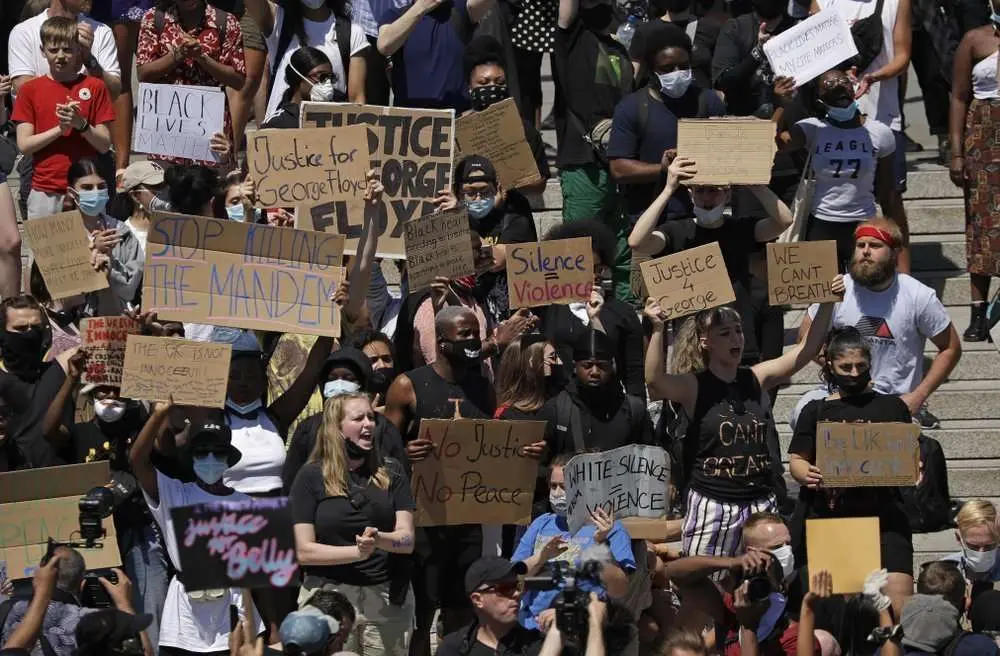Crisis within the U.S. crisis

With the death toll from the coronavirus more than doubling to 100,000, and with 40 million new unemployed as a result of the pandemic, the reckless homicide - perhaps even outright murder - of a black citizen by at least one white Minnesota police officer has ended up setting the entire United States on fire. Violent riots in at least fifty cities, suppressed demonstrations outside the White House, and intense polarization of the country in social networks are aggravating the tense atmosphere in the country, which has returned to the dark times of the civil rights struggle.
The deplorable and highly condemnable actions of the police involved in the death of citizen George Floyd have been immediately registered as a new act of racism that continues to beat in the depths of WASP (white, Anglo-Saxon and Presbyterian) hearts, in which the very essence of American power is to be seen. President Donald Trump's loquacious verbiage on social networks has also been used to accuse him of harbouring racist impulses and associating him with resurrected Ku-Klux-Klan emuls. Obviously, the images of all this, including police arrests and assaults on journalists who narrated it live, help to fix in the retina of the average global viewer the idea that apartheid has not yet been eradicated from the country that embodies Western civilization.
This is obviously a glaring inaccuracy. The equalization of civil rights is a fact, achieved certainly thanks to the tireless struggle to eradicate injustice. This does not mean that there are still many individual behaviours in which racist impulses emerge, a feeling that cannot be blamed on the entire multiracial, multi-ethnic and very diverse American people. The federal, state and local police forces are full of black agents and commanders, but this does not prevent them from generally employing forceful methods, and on more than a few occasions some of their individuals have lost their heads, hands or knees, as in the case of Derek Chauvin, who has already been expelled from the police force.
The frequent use of force and the not insignificant lightness in pulling the trigger at the slightest suspicion probably has much more to do with the existence of 270 million legal weapons in the hands of citizens. Not all of these are exemplary, so police suspicion is a habit acquired through experience that not everyone asks innocently for information.
Floyd will be counted among this year's police victims. If this continues, it will surely be an even more discouraging outcome than that of 2019, when 1,004 people died at the hands of the police. But the breakdown reveals that most of them, 370, were white, with 235 black, 158 Hispanic, 39 of another ethnic denomination, and 202 of unknown race, according to a Washington Post count. Alleged American police brutality thus does not appear to be determined by racism but rather by the fact that more than 50% of crimes are committed by black citizens. In any case, the figures show the long road that remains to be traveled in pursuit of equality, a horizon to which the entire human race aspires, but in whose race to reach it there are notable differences between countries, continents and, of course, ethnic groups.
The chain of crises has much to do with the fact that the United States is immersed in the electoral campaign that will determine in November whether Trump will continue or not four more years as president. And, coinciding with these crises, the Republican, and therefore the ultraconservative Trump, has unleashed another one that has caught the left side off guard: the reform of the so-called Communications Decency Act. Passed in 1996, its section 230 stipulates that "no provider or user of an interactive computer service may be treated as a publisher or issuer of any information from any other information content provider. In clear, this means that social networks are not responsible for the content published on them, however false, offensive or criminal it may be. Thanks to the neutrality guaranteed by this law, giants such as Facebook have been born and have grown and the number of uncensored messages on social networks has multiplied to infinity.
However, Donald Trump has been moved by the fact that Twitter has labelled his latest messages as misleading, which in his opinion is tantamount to labelling them, that is to say, doing an editorial job like any other news media. Paradoxical as it may seem, Trump highlights with this movement the preservation of freedom of expression and the neutrality of the Internet, that which prevents platforms from not censoring, for example, the calls by Iranian leader Ali Khamenei to destroy Israel, or Nicolas Maduro's accusations to Washington of promoting his assassination or coups d'état against Venezuela.

